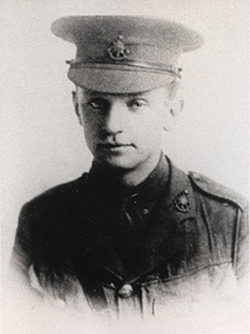12 August 2018
Surrey First World War hero remembered

To mark the end of the First World War Centenary, the Commonwealth War Graves Commission (CWGC) has launched its “Road to Peace” campaign. The campaign tells 120 personal stories of casualties who died during the final 100 days of the First World War, from 8 August to 11 November.
The CWGC commemorates a staggering 120,000 men and women who died between 8 August and 11 November 1918.
One remarkable story is that of Captain Eric McNair VC, from Surrey who died in August 1918
The stories have been compiled by the CWCG’s team of historians and includes the remarkable account of Captain Eric McNair, a First World War hero from Surrey who was awarded the Victoria Cross aged 21.
Educated at Charterhouse School in Surrey, Eric aged 19, applied for a Commission in the British Army. After training, Eric was sent to France as a Lieutenant in the 9th Battalion of the Royal Sussex Regiment. Their first action was during the Battle of Loos in 1915, where the regiment suffered heavy losses against the Germans.
In 1915, the young Lieutenant and his regiment were sent to Belgium. It was during Eric’s time in Belgium that he earnt the Victoria Cross for his remarkable gallantry. In February 1916, Eric and the regiment were holding the line in the Ypres Salient. In the early hours of 14 February, the Germans blew two mines under their trenches. For his actions following the detonation, Eric aged 21 was awarded the Victoria Cross.
The London Gazette dated 28 March 1916 recorded:
“When the enemy exploded a mine, Lieutenant McNair and many men of two platoons were hoisted into the air, and many men were buried. But, though much shaken, he at once organised a party with a machine gun to man the near edge of the crater and opened rapid fire on a large party of the enemy, who were advancing. The enemy were driven back, leaving many dead. Lieutenant McNair then ran back for reinforcements, and sent to another unit for bombs, ammunition and tools to replace those buried. The communication trench being blocked he went across the open under heavy fire and led up the reinforcements the same way. His prompt and plucky action and example undoubtedly saved the situation."
In May 1916, he returned to England to receive his Victoria Cross, however he was soon back in France and in August he was badly wounded during The Battle of the Somme.
Although not fully recovered, Eric volunteered for further service and in April 1918 was sent to Italy to work for the Commander of the British Forces there. Tragically, he soon fell ill and died of chronic dysentery in a hospital in Genoa. He was just 24. He was laid to rest in the CWCG Staglieno Cemetery in Genoa.
From famous casualties like war poet Wilfred Owen, through to relatively unknown individuals; from those dying in battle to those who died of Spanish Flu; each story has been carefully chosen to shine a light on the human stories on the costly Road to Peace.
CWGC Historian, Max Dutton, explained: “Behind every one of our headstones or names on a memorial to the missing, is a human story just waiting to be told. Our 100 days ‘Road to Peace’ campaign will remind people of the human cost of the Great War, the sheer diversity of those who took part and the global nature of that sacrifice and remembrance today.
We hope Eric’s story will inspire people to find out more about him and his comrades commemorated by the CWGC and visit their graves and memorials. Many people might be surprised to learn we have First World War graves in Italy and we hope many more people will visit them and remember the sacrifices made”
Starting on 8 August – the 100th anniversary of the Allied victory at the Battle of Amiens – the “Road to Peace” campaign will conclude on 11 November with the stories of 11 people who died on the very last day of the First World War, even as the guns fell silent. The “100 Days” is a term applied to the final period of the First World War, during which the Allies launched a series of offensives on the Western Front that ultimately led to peace. Not actually 100 calendar days, the term is a reference to the final period of the Napoleonic Wars.
The Road to Peace stories will be shared across the CWGC’s digital channels on Facebook, Twitter and Instagram. A story will appear every day – with a more in-depth feature appearing weekly.

